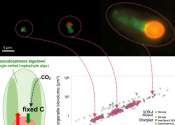Scientists discover new phage resistance mechanism in phage-bacterial arms race
One of the most abundant and deadliest organisms on Earth is a virus called a bacteriophage (phage). These predators have lethal precision against their targets—not humans, but bacteria. Different phages have evolved to ...









